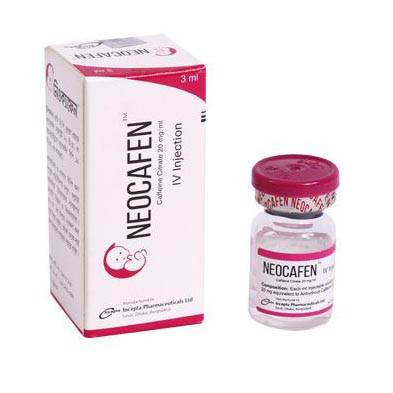3 ml vial:
৳ 150.00
Indications
Neocafen is indicated for the treatment of apnea of prematurity.
Pharmacology
Caffeine is structurally related to other methylxanthines, theophylline and theobromine. It is a bronchial smooth muscle relaxant, a CNS stimulant, a cardiac muscle stimulant and a diuretic. Although the mechanism of action of caffeine in apnea of prematurity is not known, several mechanisms have been hypothesized. These include:
- stimulation of the respiratory center,
- increased minute ventilation,
- the decreased threshold to hypercapnia,
- increased response to hypercapnia,
- increased skeletal muscle tone,
- decreased diaphragmatic fatigue,
- increased metabolic rate,
- increased oxygen consumption.
Dosage & Administration
Loading Dose: Dose of Caffeine Citrate-20 mg/kg. Route-Intravenous infusion (over 30 minutes) by using a syringe infusion pump. Frequency- One Time.
Maintenance Dose: Dose of Caffeine Citrate-5 mg/kg. Route-Intravenous infusion (over 10 minutes) by using a syringe infusion pump. Frequency-Every 24 hours (beginning 24 hours after the loading dose).
The duration of treatment of apnea of prematurity in the clinical trial was limited to 10 to 12 days. The safety and efficacy of caffeine citrate for longer periods of treatment have not been established. Vials containing visible particulate matter should be discarded. For single use only. Any unused solution should be discarded.
Maintenance Dose: Dose of Caffeine Citrate-5 mg/kg. Route-Intravenous infusion (over 10 minutes) by using a syringe infusion pump. Frequency-Every 24 hours (beginning 24 hours after the loading dose).
The duration of treatment of apnea of prematurity in the clinical trial was limited to 10 to 12 days. The safety and efficacy of caffeine citrate for longer periods of treatment have not been established. Vials containing visible particulate matter should be discarded. For single use only. Any unused solution should be discarded.
Interaction
Few data exist on drug interactions with caffeine in preterm neonates. Based on adult data, lower doses of caffeine may be needed following co-administration of drugs which are reported to decrease caffeine elimination (e.g., cimetidine and ketoconazole) and higher caffeine doses may be needed following co-administration of drugs that increase caffeine elimination (e.g., phenobarbital and phenytoin). Inter-conversion between caffeine and theophylline has been reported in preterm neonates. The concurrent use of these drugs is not recommended.
Side Effects
Few cases of sepsis, hemorrhage, necrotizing enterocolitis, gastritis, gastrointestinal hemorrhage, acidosis, cerebral hemorrhage, dyspnea, lung edema, dry skin, rash, skin breakdown, kidney failure were reported.
Pregnancy & Lactation
Pregnancy Category C. Caffeine is excreted into breast milk. Breast-feeding mothers of newborn infants treated with Caffeine Citrate should not ingest caffeine-containing foods, beverages or medicinal products containing caffeine.
Precautions & Warnings
Neocafen should be used with caution in infants with seizure disorders, cardiovascular disease and impaired renal or hepatic function. Serum concentrations of caffeine should be monitored and dose administration of Neocafen should be adjusted to avoid toxicity in this population.
Overdose Effects
Serious toxicity has been associated with serum levels greater than 50 mg/L. Signs and symptoms reported after caffeine overdose in preterm infants include fever, tachypnea, insomnia, tremor, hypertonia, seizures, vomiting, hyperglycemia, elevated blood urea nitrogen and elevated total leukocyte concentration. Neocafen levels have been shown to decrease after exchange transfusions. Convulsions may be treated with intravenous administration of diazepam or a barbiturate such as pentobarbital sodium.
Therapeutic Class
Painkiller Muscle Relaxant
Storage Conditions
Do not store above 30°C. Keep away from light and out of the reach of children.


